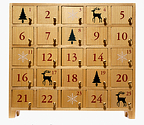Happy New Year!
Are you having a Happy New Year?
Yes, I know it’s early in December. Yes, I know we’re still in 2010. And, yes, I know that the giant crystal ball in Times Square hasn’t yet fallen. Of course I’m aware that we haven’t even celebrated Christmas yet. (Photo: The crystal ball that fell in Times Square at the beginning of 2008. Photo by Clare Cridland, Wikimedia Commons.)
Still, I want to ask: Are you having a Happy New Year?
If you’re a member of a highly liturgical church, such as Catholic, Episcopal, or Lutheran, what I’ve just said makes sense. (If you’re Eastern Orthodox, you think I’m three months behind the time.) But if you’re not involved in such a church, I had better explain what I’m talking about.
The Christian year, sometimes called the church year or the liturgical year, is a centuries-old way that many Christians have ordered the 365-day year. It depends, not on the positions of the sun and moon, or on the start and end of school, or on the requirements of the IRS, but rather on key aspects of the life of Christ that are coordinated with the solar calendar. The major holidays (literally, holy days) in the church year are Christmas (December 25), Good Friday and Easter (in the spring, dated according to Jewish Passover), and Pentecost (seven weeks after Easter). Every other special day or season fits around these crucial days (Advent, Epiphany, Ash Wednesday, Lent, Palm Sunday, Holy Week, Maundy Thursday, etc.).
When I have taught worship leaders from around the country, I have often asked about their awareness of the liturgical year. It used to be that the vast majority had little or no knowledge of it, apart from the big holidays, Christmas and Easter. If they had any sense of the liturgical year, they assumed that it was something for Catholics and other high church folk, with little relevance for the rest of us. I can understand this perspective because I was raised in a church that recognized Christmas, Palm Sunday, Good Friday, and Easter, but that’s about it. I had always assumed that things like Lent were for my Catholic friends. And since Lent seemed to involve some sort of fasting, I was happy to leave it well enough alone. Give me the feasts, I reasoned. Leave the fasts for the Catholics and Jews. (I didn’t have any sense of Ramadan back then.)
It wasn’t until I was preparing for ordained ministry that I gained some exposure to the Christian year. I learned – much to my surprise – that many Presbyterians and other Protestants take this stuff quite seriously. For the first time in my life, I heard a Presbyterian pastor get excited about the benefits of the church year for corporate worship and private devotions. I was curious, though I didn’t quite get his enthusiasm. What difference would the liturgical year make in my life? The answer seemed to be: none at all.
When I became the Senior Pastor of Irvine Presbyterian Church in 1991, the church had a history of recognizing more of the liturgical year than I had acknowledged before. During my sixteen-year tenure there, I grew to appreciate the richness that such a perspective can bring to the worship life of a church, as well as to my own devotional life. The truth is, all kidding aside, that I actually began to experience the first Sunday of Advent (in late November or early December) as the beginning of a new year.
Today, though I am no longer a parish pastor, I can feel the flow that begins with Advent and carries me through the birth of Jesus to his death and resurrection, and beyond that to the sending of the Spirit and the celebration of Christ’s kingly reign. Believe it or not, there’s a sense in which early December begins my preparation, not just for Christmas, but also for Easter. I know this may sound odd to you, even esoteric and weird. But I’ve found that recognizing the Christian year has enriched my faith in many ways. I’d like to share some of these with you.
Now, let me hasten to add that nothing in Scripture demands recognition of the church year. We do not have in the New Testament some equivalent to Leviticus 25, where God lays out for Israel the major fasts and feasts during the year. So, although the liturgical year is structured around the biblical story of Jesus, it is not commanded in Scripture in the way of the Jewish holidays for the Jews. Of course, Christians aren’t commanded to celebrate Easter or Christmas in the way we do either. The church year, therefore, is not something all Christians must observe, or must observe in exactly the same way. (In fact, Eastern Orthodox believers have a different pattern throughout the year and even celebrate Easter on a different day!)
Nevertheless, I believe that an awareness of the liturgical year can enrich our worship and therefore our relationship with God. In fact, when I’ve taught on this subject to worship leaders who have very little idea of what I’m talking about, they have come away excited about the potential for their churches.
On Monday, I’ll provide a brief overview of the Christian year, highlighting some of its main features.
